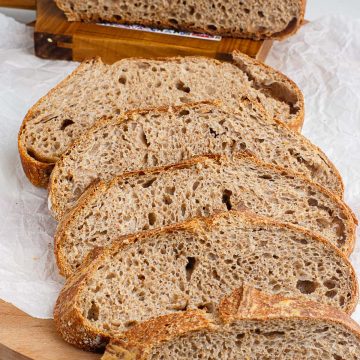
Whole Wheat Sourdough Bread
Baking your own 100 percent whole wheat sourdough bread is one of the most rewarding things you can do in the kitchen. With just a few simple ingredients, you can create a deeply flavorful loaf that’s hearty, nourishing, and full of character. This recipe is perfect for anyone who loves healthy sourdough bread with a rustic homemade touch.
Ingredients
- 350 g whole wheat flour (2 ¾ cups )
- 260 g water (1 cup + 2 tablespoon )
- 7 g salt (1 tsp)
- 70 g active sourdough starter
Instructions
Combine the Dough
- Mix whole wheat flour and room-temperature water until no dry bits remain. The dough will be shaggy and sticky—this ensures full hydration.
Autolyse
- Cover and rest the dough for 45–60 minutes. This allows gluten to start developing and makes the dough easier to handle.
Add the Sourdough Starter
- Incorporate bubbly, active starter into the dough by folding and pinching until fully combined. This begins fermentation. Cover and let it rest for about 15-20 minutes.
Add Salt (Bassinage Method)
- Now, dissolve salt in a little water and gently mix it into the dough. The dough may feel loose at first, but it will strengthen with folds.
Stretch and Fold
- Do 3–4 sets of stretch and folds over 2 hours, resting 30 minutes between sets. This builds gluten strength and structure.
Bulk Fermentation
- Let the dough ferment at room temperature for 4–6 hours (or until risen ~50% and airy). Fermentation timing depends on your kitchen temperature.
Shape the Dough
- Turn the dough onto a floured surface, gently fold and roll into a tight loaf, then place in a floured banneton seam-side up.
Proof (Cold Retard Optional)
- Rest 30–60 minutes at room temperature, then refrigerate 8–12 hours. Cold proofing improves flavor and crust.
Bake & Cool
- Preheat the oven to 500°F (260 oC) with a Dutch oven inside. Score dough, bake 20 minutes covered, then bring down the oven temperature to 450 OF ( 230 oC) 20–22 minutes uncovered. Cool for at least 2 hours before slicing.
Notes
- If your dough feels too sticky, don’t add more flour right away—stick with it. Whole wheat absorbs water slowly.
- To enhance softness, add a teaspoon of honey or olive oil.
- If your dough isn’t rising, check if your sourdough starter is active enough. Always feed sourdough starter at least 4–6 hours before baking.
- For a more open crumb, increase hydration slightly, but this works best with strong whole wheat flour.
- A dense loaf can result from under-proofing or using cold ingredients—let your dough ferment until airy and puffy.
- Always use a sharp blade to score the dough. A deep cut helps the bread rise better in the oven.
Nutrition
Calories: 85kcalCarbohydrates: 17.65gProtein: 3.14gFat: 0.83gSodium: 369mgFiber: 2.4g
Tried this recipe?Let us know how it was!